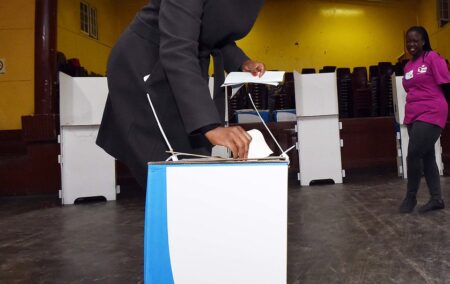Should voters lose faith in the ability of the Electoral Commission (IEC) “to manage South African elections and ensure they are free and fair, this could have serious consequences for future elections”.
So warns Marius Roodt, a senior analyst at the Institute of Race Relations (IRR), in a statement on the “myriad incidents” on Wednesday.
The IRR cautions that “(chaos) at some voting stations could lead to voters losing faith in the IEC, which would have broader implications for the resilience of democracy in South Africa in the medium term”.
The Institute has called for an independent inquiry into the causes of what went wrong at various places of voting on Wednesday, saying that “(these) issues must be resolved before the next Local Government Elections, scheduled for 2026, to preserve the integrity of the IEC – and the credibility of South Africa’s democracy”.
Reports from around the country indicate that the IEC had “a mixed day” yesterday. “While some people managed to vote fairly quickly and without much hassle, others stood in queues for many hours. Reports indicate that there were some who did not manage to vote at all. This includes an unknown number of people turned away from voting stations because they were registered elsewhere and were not aware that – contrary to past practice – they had to inform the IEC before 17 May if they wanted to vote in a different place.”
Roodt says: “It is vital that the IEC is able to do its job efficiently and that it is well-resourced to do so. Elections are the lifeblood of a democracy and one of the core components in a democracy is how trustworthy those who count the votes are. While there is no suggestion that the IEC is not trustworthy, the myriad incidents yesterday across the country, which left voters frustrated, means that the IEC will increasingly be viewed as an organisation which is not always able to do what it is supposed to do properly or well. This also has serious implications for how voters perceive elections and whether they are free and fair.”
Continues Roodt: “IRR polling in 2023 found that over 60% of respondents believed that the 2024 election would be free and fair. Given the problems many voters faced on Wednesday, it is an open question whether such a big majority of people believe that the next election will be free and fair.”
Roodt flags the issue of funding for the IEC and how that could have played a role in some of the IEC’s travails yesterday.
He notes: “Many of the issues on Election Day were because the IEC, like many of our state organisations and bodies, has had its funding reduced significantly. Taking inflation into account the budget of the IEC is about 13% less than it was ten years ago. No organisation can continue to function at an optimal level if the resources available to it are cut to that degree.”
Roodt concludes: “It is of paramount importance that the IEC is given the resources it needs to function optimally. If voters no longer trust the IEC to manage South African elections and ensure they are free and fair, this could have serious consequences for future elections in this country/”


